Quick Answer:
The list of required paperwork when selling a car privately varies by state. However, a Certificate of Title is consistently needed across the country. Depending on your state, you might also need to provide a bill of sale, undergo a VIN inspection, and provide a valid emissions test.
To substantiate the value of your vehicle and reassure prospective buyers of its upkeep, it’s recommended to have a VIN check, gather service records, and include the owner’s manual.
Key Takeaways:
- Required Paperwork Varies by State: Check with your state’s DMV for the specific documents needed to sell your car privately, such as the Certificate of Title, Bill of Sale, VIN inspection, and emissions test certificate.
- Safeguard Against Scams: Protect yourself by screening buyers, using secure payment methods, and meeting in public places. Be cautious of common fraud tactics.
- Seller’s Financial Responsibilities: Typically, the seller handles title transfer fees and may need to cover sales tax and other costs. Ensure you’re aware of these expenses to prevent surprises.
Best Used Car Buyers
Peddle

Trustpilot Rating
Get a legit offer in minutes – provide VIN, mileage and condition
$0 fees + you don’t have to pay for towing – Peddle will take care of it
Get paid in check during the pick up for any car (damaged, junk)
Wheelzy

Trustpilot Rating
Quick car evaluation without the hassle – sell your car within 30 min
Choose a convenient date and time for free pick-up, even tomorrow
Get cash in hand the same day the Wheelzy agent picks up your car
What Paperwork Do I Need to Sell My Car
1. Certificate of Title
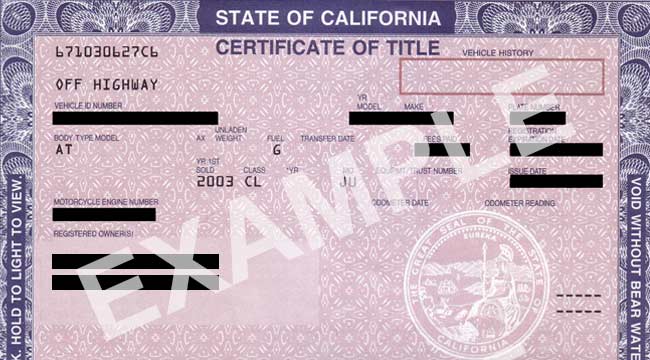
The Certificate of Title is an official document issued by a state’s government, confirming a vehicle’s ownership and enabling its legal sale. This document is essential for ownership transfer when selling a vehicle.
It’s recommended to store this document securely with other important papers, but not in the glove compartment, to avoid theft or loss.
For selling a vehicle, the owner must fill out and sign the designated “Seller’s section” on the document’s backside, which typically includes:
- The buyer’s full name and address
- The vehicle’s odometer reading at the time of sale
- The transaction price
- The date of sale
The seller must sign in the specified “owner’s signature” area.
For the transfer of ownership to be finalized, the buyer must also sign their respective section on the title document.
In the Case of the Financed Car
When you have a car loan and misplace the title, your first step should be contacting the financing institution. Given that lenders hold legal ownership until the vehicle’s full payment, they will possess the Certificate of Title.
It’s important to be aware that it can be complex to sell a car that’s under financing privately, and it’s often recommended to settle any outstanding loans prior to sale. If settling the loan isn’t an option, consider using a service like CarGurus.
CarGurus allows you to sell a car 100% online, even if you have a loan on it. The company will handle the loan payoff for you. If you owe more on the loan than your car is worth, you can pay the difference to CarGurus directly to settle the lien in one payment.
2. Bill Of Sale
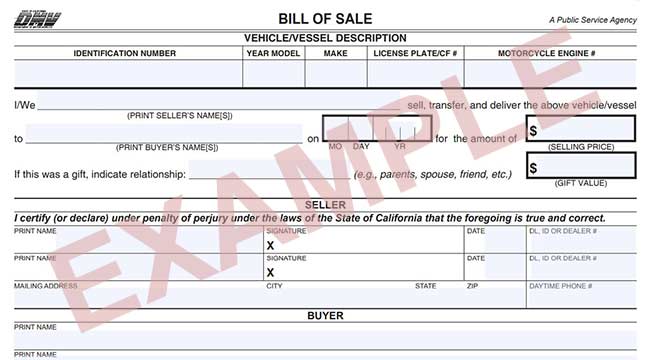
In certain states, a bill of sale is necessary for transferring vehicle ownership. While it may not always be mandatory, signing one is advisable as it can safeguard both the seller and the buyer in case any disputes arise later on.
States that require a Bill of Sale when selling a car:
| State | Note |
|---|---|
| Alaska | Baldwin County only |
| Connecticut | – |
| Florida | – |
| Georgia | – |
| Idaho | – |
| Indiana | – |
| Louisiana | – |
| Maine | Must be notarized |
| Massachusetts | – |
| Michigan | – |
| Missouri | Must be notarized |
| Montana | Must be notarized |
| Nebraska | Must be notarized |
| Nevada | Must be notarized |
| New Jersey | – |
| New York | – |
| Ohio | Must be notarized |
| Rhode Island | – |
| South Dakota | – |
| Texas | – |
| Vermont | Must be notarized |
| Washington | – |
| West Virginia | Must be notarized |
| Wyoming | – |
In some states, for older vehicles, a bill of sale may be accepted in place of a Certificate of Title if the original document is missing or has been lost.
This exemption is specific to these states:
- Alabama – 35 years or older
- Connecticut – 20 years or older
- Georgia – the year 1986 or older
- Kansas – the year 1949 or older
- Maine – year 1994 and older
- Maryland – 20 years or older
- Massachusetts – year 1980 and older
- New Hampshire – year 1999 or older
- Ohio – 25 years or older
- Rhode Island – year 2001 and older
- Vermont – 15 years or older
3. Emissions Test
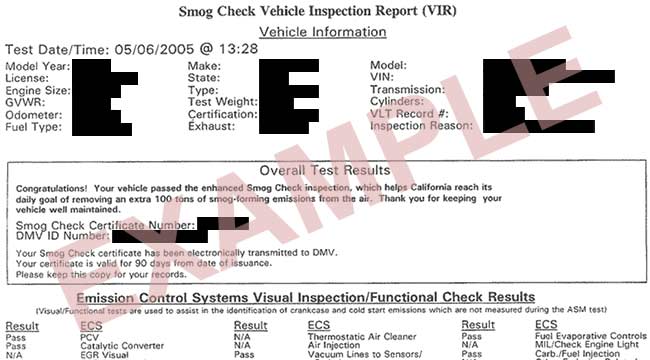
In certain states, presenting proof of a valid emissions test is required for the transfer of a vehicle’s title. The testing process typically lasts around 20 minutes and may cost anywhere between $10 and $30.
Should the vehicle not pass the emissions test, it remains sellable. However, the potential buyer may experience difficulties when attempting to register it.
To prevent any disagreements, it’s important to indicate any inspection failures in the bill of sale. This includes specifying that the vehicle is being sold in its current condition, for example, “as is” or “non-operational.”
States that require sellers to provide valid emissions tests:
| State | Note |
|---|---|
| Arizona | Required |
| California | Required |
| Colorado | Required |
| Connecticut | Required |
| Delaware | Required |
| Georgia | Required |
| Idaho | Required |
| Illinois | Required |
| Louisiana | Required |
| Maine | Required |
| Maryland | Required |
| Missouri | Required |
| Nevada | Required |
| New Jersey | Required |
| New Mexico | Required |
| New York | Required |
| North Carolina | Required |
| Ohio | Required |
| Pennsylvania | Required |
| Rhode Island | Required |
| Texas | Required |
| Utah | Required |
| Vermont | Required |
| West Virginia | Required |
| Wisconsin | Required |
4. VIN inspection
Depending on the state, a VIN inspection may be required for all used cars on sale, or it may be necessary only for specific categories of vehicles, such as those coming from another state or cars that have been reconstructed or salvaged.
To ascertain whether a VIN inspection is required for selling your car, you should reach out to the DMV in your state. Additionally, the DMV website for your state will provide detailed information regarding VIN inspection requirements.
States that require VIN inspection when selling a car:
| State | Note |
|---|---|
| California | Required if vehicle does not meet emission standarts |
| Connecticut | Required if vehicle does not meet emission standarts |
| Louisiana | Required |
| Missouri | Required |
| Nebraska | Required |
| Nevada | Required |
| New Hampshire | Required |
| New Jersey | Required |
| New York | Required |
| North Carolina | Required |
| Oregon | Required |
| Rhode Island | Required |
| Texas | Required |
| Virginia | Required |
| Wyoming | Required |
5. Report the Sale
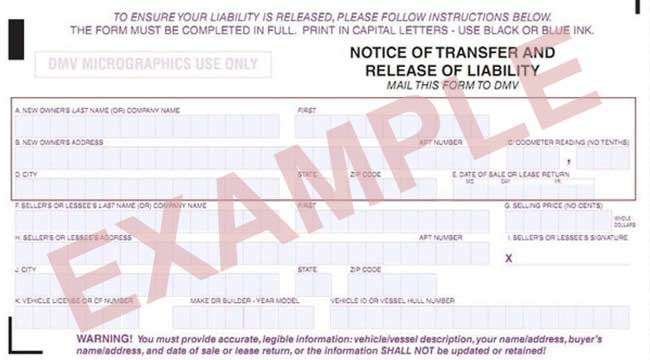
Some states also require the seller to report the sale to DMV. This can be done by filling out the provided paperwork to waive responsibility for potential damages after finalizing the sale.
If you fail to sign the form, you might be accountable for the following:
- Paying for parking tickets
- Paying for speeding tickets
- Taking responsibility for traffic violations
- Taking responsibility for criminal actions associated with the vehicle
- Taking responsibility for hit-and-run accidents
Most states allow you to submit the form online or via mail, but you may have to visit the DMV office in person to complete the paperwork.
You will be asked to provide the following information:
- Your name and contact information
- Buyer’s name and contact information
- The car’s license plate number
- Car’s make, model, year, and color
- VIN number
- Odometer readings at the time of the sale
- The date of the title transfer
States that require you to report the sale:
| State | Period |
|---|---|
| Alaska | within 10 days |
| Arizona | within 10 days |
| Arkansas | within 30 days |
| California | within 5 days |
| Colorado | within 5 days |
| Connecticut | within 15 days |
| Delaware | – |
| Florida | within 30 days |
| Hawaii | within 10 days |
| Illinois | – |
| Iowa | – |
| Kansas | – |
| Kentucky | within 15 days |
| Louisiana | |
| Minnesota | within 10 days |
| Missouri | within 30 days |
| Nevada | within 5 days |
| New Mexico | – |
| New York | – |
| North Dakota | – |
| Oklahoma | – |
| Oregon | – |
| South Carolina | – |
| South Dakota | Within 15 days |
| Tennessee | Within 10 days. Find form on ont title |
| Texas | Within 30 days |
| Utah | – |
| Virginia | – |
| Washington | – |
| West Virginia | Fill out at the local DMV office |
| Wisconsin | Within 30 days |
Additional Paperwork:
5. Registration Tag
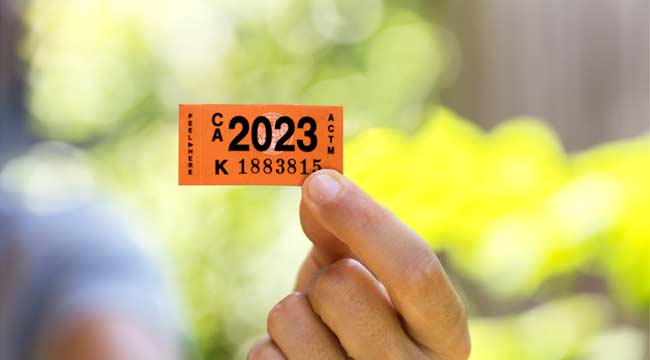
All vehicles operating on public roads across the country are required to have a valid registration. Driving an unregistered vehicle, or one with an outdated registration, could result in a penalty of $100 to $200.
While it’s permitted in certain states to sell a car with lapsed registration, this could make the sale more challenging for various reasons:
- Potential buyers can’t test drive on public roads.
- Buyers can be concerned about the condition of the vehicle or the legality of the sale.
- Buyers may be less willing to pay the full price due to the risk of the responsibility of paying any late fees.
- You may need to complete additional paperwork. Some states require additional paperwork, such as a bill of sale, a transfer of ownership form, and a statement of non-responsibility.
6. VIN Check
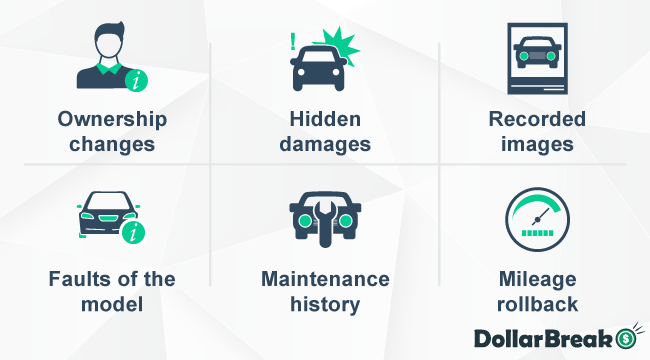
A VIN check (vehicle history report) contains a range of information on a car, including previous owners, odometer readings, open recalls, damage, accidents or repairs.
A VIN check will help you prove your car’s value, providing potential buyers with reasons why they should pay the requested amount for your car.
The car report is sourced from:
- Government agencies
- DMV
- Police departments
- Junk and salvage yards
- Insurance companies
- Manufacturers
- Car dealerships
- Auto recyclers
- Auto auctions
- Law enforcement agencies
- Collision repair facilities
To get a detailed VIN report, consider using carVertical. The report costs $18.56, uses the latest data, has a money-back guarantee and is one of the most reliable VIN check providers on the market.
The carVertical report includes:
- Service data and report costs
- Mileage rollbacks
- Damage history
- Foults history
- Ownership history
7. Service Records
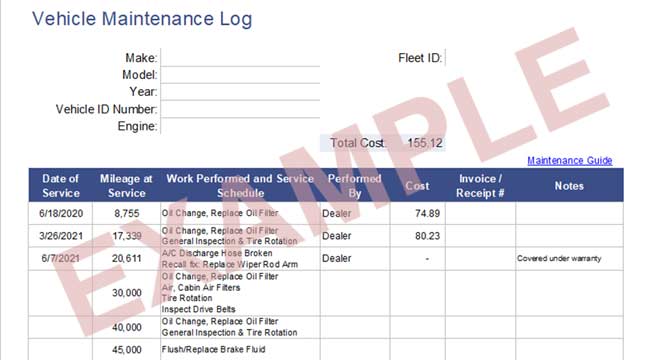
Having a complete set of service records is a major asset when selling your car privately. It acts as proof of your vehicle’s maintenance, instilling trust in potential buyers and validating the investment they are about to make.
The records provide information about procedures your car has undergone, including:
- Oil changes
- Tire rotations
- Brake replacements
- Changed parts
This can be a strong leverage point during price negotiations, justify a higher price tag, and may ultimately be the key element that completes the sale.
8. Owner’s Manual
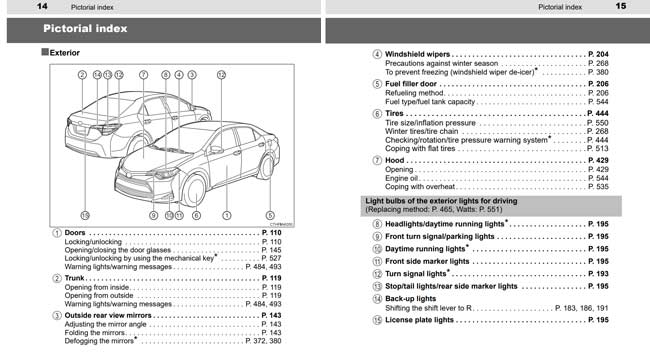
Providing the owner’s manual with your car sale is beneficial for several reasons:
- It serves as a comprehensive guide to the vehicle’s features and maintenance requirements, which is particularly useful for those new to car ownership.
- The manual is a testament to the care you have put into your vehicle and can enhance its desirability and market value to prospective buyers.
If the manual is missing or was never received, check for the car’s manual online. There is an option to buy a manual and have it shipped to you, which may take up to five weeks, or you can purchase a digital version for immediate access.
Tips When Selling Privately
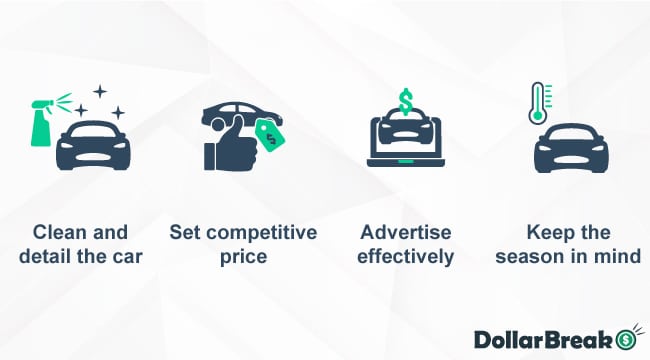
Selling your car privately can offer significant benefits but also comes with its complexities. To ensure a successful sale, implement the following tactics:
Clean and Detail Your Car: Wash the exterior, tidy up the inside, and declutter spaces like the trunk. If your car has been exposed to smoke, a new air freshener can make a big difference.
Refreshing minor components like floor mats can also increase value with minimal investment.
Set a Competitive Price: Establish a competitive price by referencing resources like Kelley Blue Book. Input your vehicle’s details to obtain a recommended price range. Start with a figure slightly higher than market value to give room for negotiation, but be ready to adjust if you don’t attract buyers.
Advertise Effectively: Post your ad on multiple platforms, including online car-selling sites like eBay Motors and AutoTrader.
Ensure your car stands out with high-quality photos and a comprehensive description.
Keep the Season in Mind: Peak times include the period before new models are released and when people get tax refunds, typically outside of the holiday season. Convertibles and spacious vehicles are more attractive in spring and summer, while four-wheel drives gain popularity in fall and winter.
Do You Pay Taxes When You Sell A Car Privately?
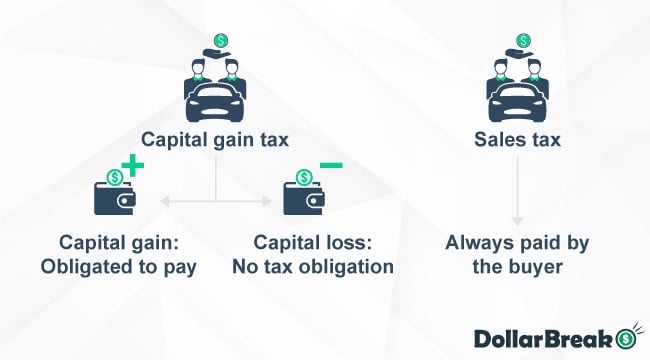
Whether or not you need to pay taxes when selling a car hinges on the selling price compared to the original purchase price.
Selling for less than the purchase price results in a capital loss, which does not attract tax from the Internal Revenue Service (IRS).
However, if the sale price is higher than the purchase price, it is treated as a capital gain by the IRS, which then necessitates the payment of taxes on the profit made.
The rate at which capital gains are taxed varies based on your income bracket, how long you’ve owned the vehicle, and the amount of gain realized.
The sales tax incurred from buying a car is generally the buyer’s responsibility, not the seller’s, and so is not a cost you would need to cover after selling your car.
How To Protect Yourself When Selling A Car Privately?
Your safety and protection are paramount when selling a car privately. Always take precautions to ensure you’re conducting a secure and legitimate transaction.
- Check the Buyer’s Identity: Ask for identification before you arrange a test drive. This helps prevent theft and helps hold the right person accountable if there’s an accident during the test drive.
- Don’t Share Personal Information: Keep your home address, bank account details, and other personal information confidential. Only share information necessary for the sale at the time of title transfer.
- Use a Safe Payment Method: Cashier’s checks, money orders, escrow services, or bank transfers can protect you from fraud. Avoiding personal checks or promises to pay at a later date.
- Meet in a Public Place: When showing the car or meeting for payment, choose a busy public place during daylight hours for safety.
- Document Everything: Record all interactions and agreements with the buyer. This is especially important for payment arrangements and the terms of the sale.
- Create a Bill of Sale: Prepare a bill of sale for both parties to sign once the transaction is complete. It should include details of the car, the sale price, and the car’s condition at the time of sale.
People Also Asked
How do I replace a lost title?
In the event that your car title is missing, you need to fill out a “Duplicate Title Application” at the nearest DMV office.
When you go, make sure to bring along a valid identification such as your driver’s license, the Vehicle Identification Number (VIN), and details about your vehicle, like its make and model.
The cost for a replacement title varies across different states, and you might spend anywhere from $5 to $60 for this service. Typically, it will take about 7-10 business days to receive your duplicate title.
However, if it’s being sent by mail, it might take as long as 30 days to arrive.
Should you need to expedite the process, expedited services are available, but be aware that this will incur extra charges.
How to sell a car without a title?
When transferring car ownership, every state mandates having a Certificate of Title. If you need to sell a car without the Title, you are required to reach out to the former owner to facilitate a title transfer into your name or apply for a Duplicate Title at the local DMV.
For those dealing with vintage vehicles, the selling process may differ. In some states, a Bill of Sale alone might suffice to finalize the transaction.
How to sell a car with a loan privately?
When selling a car you still owe money on, you need to settle the outstanding loan before the sale.
If it’s not feasible to pay it off beforehand, you can price the car to cover at least the remaining loan balance. This way, the payment from the buyer can be directly applied to clear the loan.
After the loan is fully paid, the vehicle’s title can be legally transferred to the buyer. Always disclose this condition to the potential buyer before finalizing the sale.
Who pays the car sale tax when selling a car privately?
Sale tax is an obligation of the buyer. The seller is required to pay tax on the capital gain only if the sale price of the car exceeds the original purchase price.
How to sell a car privately for cash safely?
When putting a car up for sale, it’s essential to choose a payment method that offers security and reduces the possibility of fraudulent transactions.
Generally safe payment methods:
- Cash
- Cashier’s Check
- Money Order
- Escrow Service
- Wire Transfer
Generally unsafe payment methods:
- Personal Checks
- Third-Party Checks
- Installment Payments
- Out-of-country Transactions





